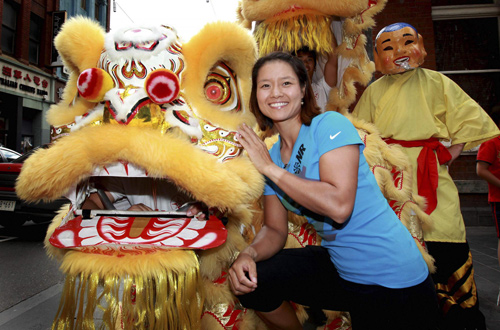Tennis
Li Na close to China's first Grand Slam singles final
Updated: 2011-01-26 13:17
(Xinhua)
|
 Tennis player Li Na of China poses with performers in lion dance costumers during her visit to Chinatown in Melbourne January 25, 2011. [Photo/Agencies] |
MELBOURNE, Australia - China's Li Na on Tuesday breezed past German Andrea Petkovic 6-2, 6-4 in the Australian Open women's singles quarterfinals, and continues her battle to be the first Chinese player to make it to a Grand Slam final.
|
||||
"I have just went through today's game less than an hour ago, isn't it too tough for me if i already start worrying about the next match," Li Na told reporters in Melbourne on Tuesday. "Right now just totally rest."
Last year, she reached the Australian Open semifinals and moved into the top 10 for 16 weeks.
She has carried that form into the new year of 2011, beating third seed Belgian Kim Clijsters to become the champion of Sydney International, a tune-up event for the Australian Open.
The 28-year-old Li has become a crowd favorite in Australian Open with highly talented and professional manner on the court to crash out her opponents. However, quickly after the game she turns to a nice, smart lady with quick wit and sharp sense of humor.
It is very difficult to tell from her manner that Li is carrying a heavy burden.
Sporting success is considered a matter of national pride in China, where table tennis and badminton remain far more widespread than Li's sport. The expectation is that a Grand Slam win would inspire a rush of new tennis players in the nation.
Li earlier joked about her coach and husband Jiang Shan, who promised to let her loose with their credit card if she won the tournament.
She beat Petkovic on Tuesday to reach the Melbourne semis for the second straight year, and was asked if it was enough to win a shopping spree, or whether she needed to go all the way to the championship.
"No, end of the tournament," she said with a smile, pointing toward her support box, where Jiang and her team had been a minute earlier but the seats were now empty. "You can see now - the credit card, he just left, you can't find him anymore."
Li said she played each of her match fairly well throughout the tournament, and enjoys very much of the freedom she has at the moment. She added that it is crucial to have her career and personal life separated.
"Life for me is very casual. If no game tomorrow, and if i think i have to do some training, I went to practice. However, if someone told me that i have to practice, i will not do it, because I do not like someone to force me," she said.
"This freedom is very conducive to build up a relaxed environment for myself. I like it this way, I know what I want, so that there is more room for myself to play."
Li gave up tennis for two years to do media studies at a university after becoming disillusioned with her lack of rankings success. She then re-entered the game in 2004.
During the two years retirement, Li admitted she sometimes casted doubts on whether she should continue her sports, because it is not popular in China, and many of her classmates and friends reckon tennis is not so interesting.
After her comeback, she gathered up her confidence, and decided to do something for the sports.
"After two years, I was feeling like, OK, I'm grown up, I should stand up to try my best," she said.
"(If I win the tournament) It will be amazing for me, amazing for my team, and may be amazing for China tennis also."
Now, she is playing better and is far happier on the court than she used to be. And with every game she wins, the prospect of a Chinese major winner grows closer.
E-paper

Ear We Go
China and the world set to embrace the merciful, peaceful year of rabbit
Preview of the coming issue
Carrefour finds the going tough in China
Maid to Order
Specials

Mysteries written in blood
Historical records and Caucasian features of locals suggest link with Roman Empire.

Winning Charm
Coastal Yantai banks on little things that matter to grow

New rules to hit property market
The State Council launched a new round of measures to rein in property prices.


